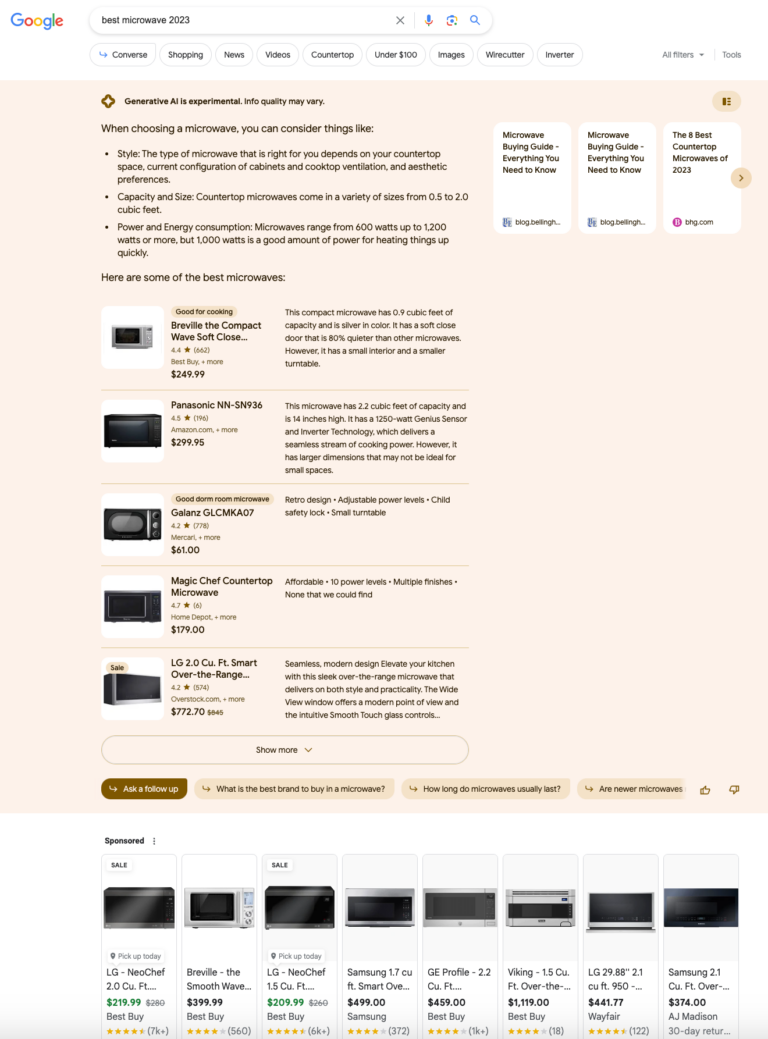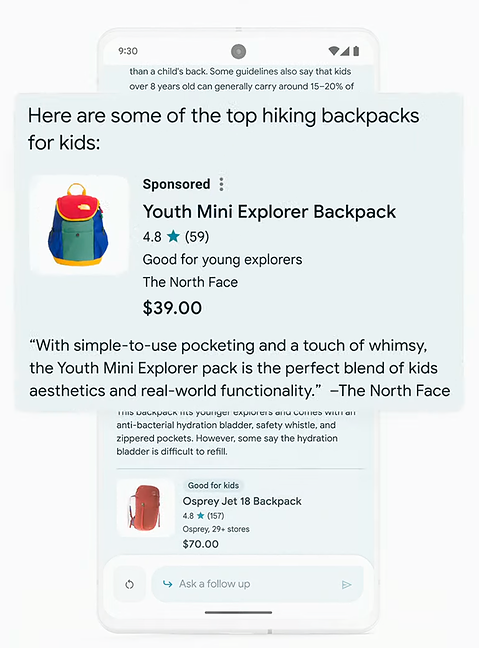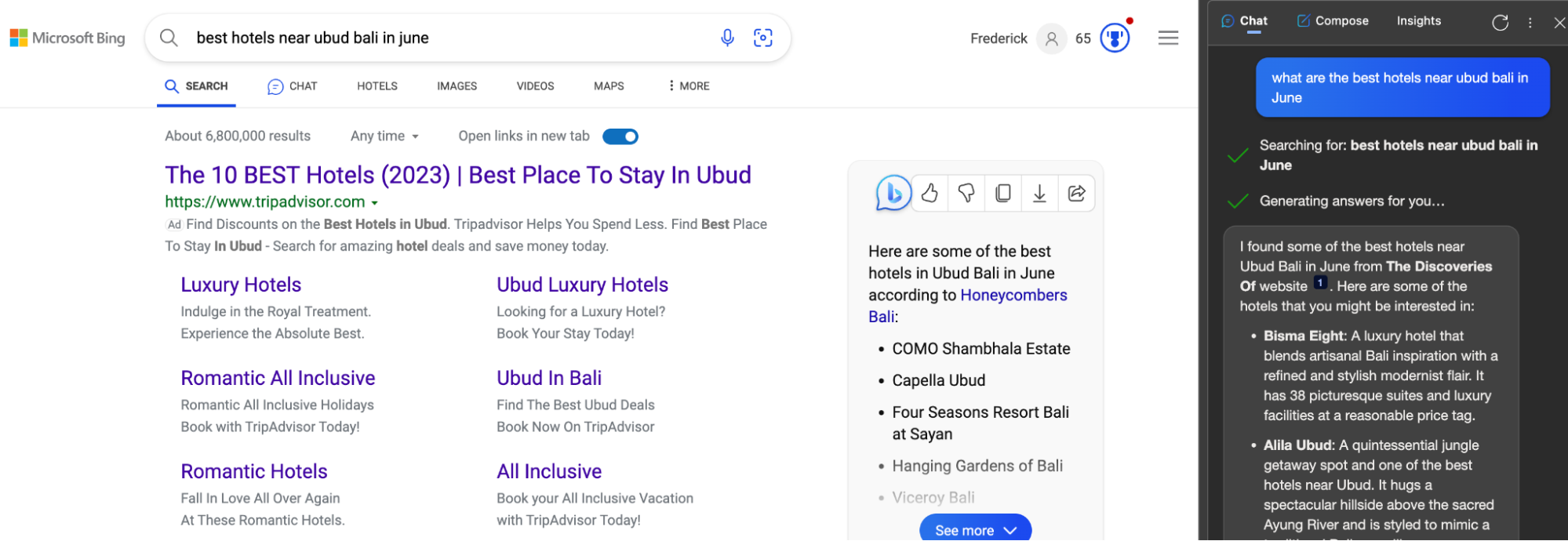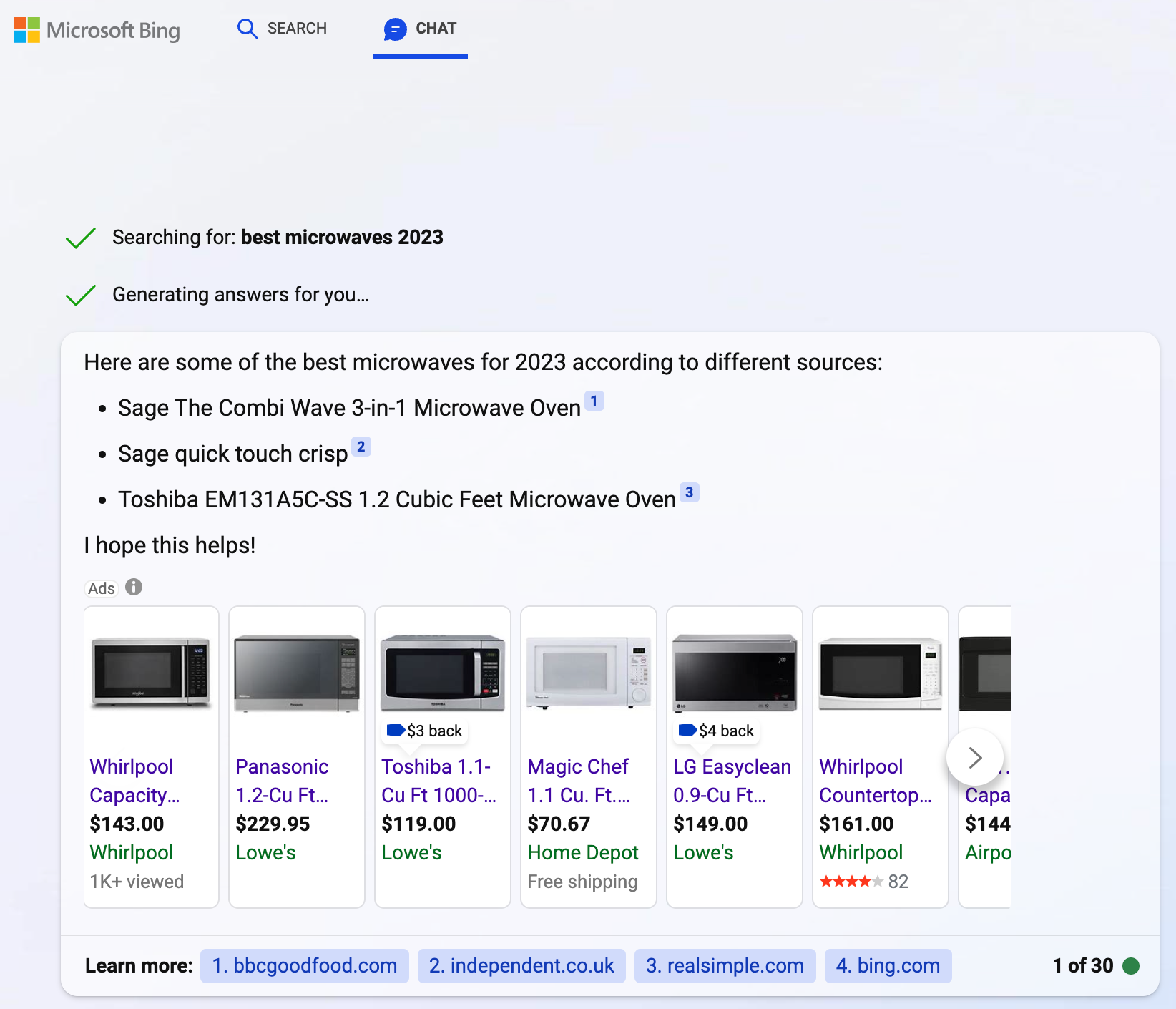There’s a major shift underway in search engine results pages (SERPs), with generative AI being used by both Google and Microsoft to offer searchers a new way to find the information they need.
Ads are already running on Bing’s generative SERPs. At the latest Google Marketing Live event, Google gave us a glimpse into what advertisements might look like within its chat-based generative Google Search Experience (GSE).
So what does this mean for advertisers and what can they do to prepare?
The short answer is that due to a lack of advertiser controls related to the new search experience, not much can be done today.
But starting to understand how the new experience may shift user behavior and how that may impact PPC strategies is the key right now.
[PPC Trends 2024] Download the free ebook →
Understanding Chat-Based Search
Chat-based search is a new feature that integrates the conversational style of chat applications and generative AI like ChatGPT with the comprehensive search capabilities of search engines.
It represents a significant shift in how users interact with search engines, with a more natural, conversational approach to query input.
To understand how this technology works, imagine that you’re in a text conversation with your search engine, posing queries in your natural, conversational language.
Instead of inputting keywords or specific search phrases into a search bar, you would type or voice out your search queries conversationally, as if you’re talking to another human or a digital voice assistant like Alexa.
These chat-based interactions could potentially include follow-up questions, clarifications, or deeper dives into the subject matter, creating a dynamic and iterative search process.
For instance, you might initially ask, “Where’s the nearest Italian restaurant?” and follow it up with “Do they have gluten-free options?” or “What are their operating hours?”
Search engines like Google and Microsoft Bing then use advanced natural language processing (NLP) and machine learning algorithms to interpret these queries, just as they would with traditional search queries.
They analyze the context and nuance of the conversational input to determine the type of response the user expects.
Unlike in traditional search, which sources each answer from individual sources, generating a response with generative AI is a complex process that relies on substantial data amalgamation.
When presented with a question, the AI does not simply retrieve an answer from a pre-existing database but generates a unique response. This response is based on the patterns and structures it learned during the training phase, where it read books, websites, and various other materials.
Generative Search Results And Ads On Google
So let’s look at the generative search experience on Google, where it is now available in beta. It adds a conversational experience at the top of the SERP.
With the conversation taking up much of the page on both mobile and desktop, the regular ads and organic results are pushed far down the page. They’re still there, but it takes a lot of scrolling to see them.
 Screenshot from Google by author, June 2023
Screenshot from Google by author, June 2023The new Google Search Experience includes generative results.
Because the conversational experience encourages follow-up questions and even makes some of the most likely follow-ups available with a single click, it may become less likely that users scroll down the SERP like they might have done in the past if the initial results didn’t meet their needs.
I have yet to see ads in conversational results myself, but Google gave a preview of what that might look like at GML.
-
 Image from GML, courtesy of Google, May 2023
Image from GML, courtesy of Google, May 2023
Ads may be added to the generative search results.
With ads coming to conversational results as well as remaining in their current locations, there will be more places for advertisers to show ads. However, the space for ads that are visible above the fold is decreasing.
That means more competition for the most desirable placements and likely a continuation of the rise in cost per clicks (CPCs).
Generative Search Results And Ads On Bing
But Google isn’t the first search engine to introduce chat-based search results. Microsoft integrated ChatGPT in its search results pages on Bing in February 2023.
Its chat experience doesn’t dominate the SERP as Google’s does. It’s either a sidebar or a full-page experience after the user switches from the search to chat tab.
This is good news for advertisers and SEO pros alike, whose current efforts aren’t disrupted as much by generative results. Microsoft’s implementation of generative search results takes much less space at the top of the SERP than Google.
 Screenshot from Bing.com, May 2023
Screenshot from Bing.com, May 2023And even when the user switches to Bing’s full-page chat experience, ads are already integrated into this experience, so advertisers aren’t losing out on as many opportunities to connect with consumers as they currently are with Google.
Ads are part of the chat search results on Bing.
 Screenshot from Bing.com, June 2023
Screenshot from Bing.com, June 2023[Free Download:] Top PPC trends to shape your 2024 strategy
Potential Impact On Ad Clicks
The arrival of conversational search does beg some questions.
For instance, will the new experience lead users to disregard traditional search results and their accompanying ads?
Could there be a temporary “tunnel vision” or attentional bias towards the new shiny thing on the page that potentially diminishes clicks on ads?
As I see it, there’s a total addressable market of conversions that should remain relatively stable. A set number of people are always looking to purchase a new fridge or need a plumber at any given time.
And many of those conversions will still go through the search engines users have made part of their research routines.
Because generative answers can compile the information that would normally have required several clicks, they may have a significant impact on impressions, clickthrough rate (CTR), and clicks.
But users love to search to validate their choices and hunt for the best price, so there may not be quite as much of an impact on how many conversions are attributed to the search engines.
What may change is what part of the SERP drives those conversions, conversational or traditional search.
Bing has been working on its generative experience longer and seems to be moving towards an implementation that includes more ads and less disruption to the traditional SERPs.
It’s fair to assume that neither Google nor Microsoft, where ads pay the bills, are likely to undercut their current business models more than needed to fend off new entrants like ChatGPT and the many other large language models (LLMs) that are cropping up every day.
Ads Shifting To Other Search Tools
Might there be a bigger shift away from Google search to other tools that include generative AI to find answers?
Microsoft announced impressive increases in its usage, with an eight-fold increase in daily downloads of the Bing mobile app. ChatGPT has posted impressive numbers, becoming the fastest consumer app to hit 100 million users, taking just 2 months.
But ChatGPT is known to produce factual errors, which may hamper it from becoming a viable alternative to search engines, which know being right is more important than just sounding right.
But generative AI will likely produce many new apps and ways for people to ask questions.
This could mean more new places to advertise. Microsoft is working to increase its network of sites and apps where ads can be shown and have created an ads solution, ads for chat API, to monetize chat experiences.
How Can Advertisers Run Ads In The New Experience?
While Google and Microsoft experiment with their new chat-based search experiences, the good news for advertisers is that the shift doesn’t require drastic changes in their approach.
Advertisers continue to use keywords, audiences, ad assets, and typical account settings to run PPC ads, which Google and Microsoft can now map to relevant chat conversations.
Microsoft’s implementation makes it clear how ads are matched.
When you are in the generative experience, the conversational query gets turned into a keyword. That keyword can then be used alongside all the other usual signals to determine which ads enter the ad auction.
Notice the part of the response labeled ‘Searching for:…,” which indicates the keyword the query has been mapped to.
The issues with the factual correctness of generative results may also make ads for brand terms more important than before.
I asked my colleague, Ashwin Balakrishnan, head of marketing for Optmyzr, for his thoughts on new strategies for advertisers.
He commented on the frequent cases where generative AI produces incorrect answers and said:
“If you can’t trust GSE and featured snippets for your branded terms – and if initial results are anything to go by, you shouldn’t (yet) – owning the ad space for your branded terms allows you to control the narrative.
Oddly enough, an ad from your brand might carry more weight and authority than an unproven AI in today’s day and age. It certainly will be more accurate.”
Google has long held that ads are information, too – and when they are useful, users will love ads.
In the age of generative AI, ads are held to higher standards for correctness and may indeed become a more trusted source for answers.
Optimization Tips For Ads In Generative Results
Because users ask questions differently when using a conversational approach, advertisers should enable broad match keywords in combination with Smart Bidding and RSAs and correctly set up conversion tracking, preferably using a VBB method.
This will allow their ads to appear near relevant conversations even when the triggered keywords may not match their keywords exactly.
But as before, it is important to monitor search query data to ensure that the AI system that drives broad match keywords properly understands your business and isn’t chasing unrelated queries that are unlikely to produce real conversions.
Advertisers should also continue to focus on high ad ranks as they have as more usage has shifted to mobile experiences with more limited screen real estate for ads.
This way, their ads are more likely to be among the few eligible ones to get an impression in a conversational experience where less space is currently available for ads.
Reporting Limitations
Since all ads are possible participants in ad auctions with the new search experience, how can advertisers ensure they are happy with the results?
Currently, neither Google nor Microsoft segments performance metrics based on whether the ad was on a SERP with the new or old experience.
This means it’s not possible for advertisers to know how ads are performing in the generative experience.
If chat-based ads yield a lower click-through rate, this will reflect in your overall results without indicating if it’s due to the new chat-based experience or other factors.
[Recommended Read] → PPC Trends 2024
Conclusion
Chat-based search is poised to redefine the consumer journey to conversion.
Advertisers will need to monitor this change, optimizing their strategies to effectively compete in the increasingly conversational and interactive search landscape.
One key will be in leveraging broad match keywords with Smart Bidding and responsive search ads (RSAs) and striving for higher ad ranks to secure a place in the limited ad space.
As Google and Microsoft advance their generative search experiences, be ready to adapt and align PPC strategies with these emerging trends so you can seize the opportunities presented by this exciting evolution in search.
More resources:
- Tools Of The Trade: When To Use ChatGPT And When To Use Google
- Conversion Optimization for PPC: Delivering On The Promise From Ad To Landing Page [Podcast]
- The Biggest PPC Trends of 2023, According to 22 Experts
Featured Image: 3rdtimeluckystudio/Shutterstock





![[SEO, PPC & Attribution] Unlocking The Power Of Offline Marketing In A Digital World](https://www.searchenginejournal.com/wp-content/uploads/2025/03/sidebar1x-534.png)